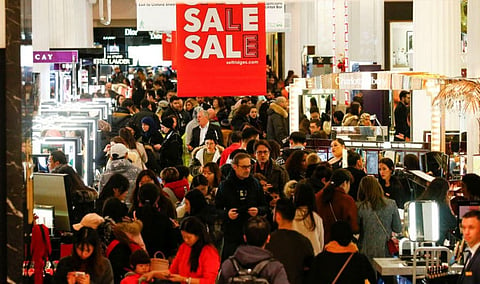

Britishshoppers ignored worries about an impending Brexit deadline and spent heavilyin March, official data showed on Thursday, supporting the country's sluggisheconomy while companies were cutting back on investment.
Retail salesvolumes surged by the most in nearly two-and-a-half years in annual terms,leaping by 6.7 percent. That was way above all forecasts in a Reuters poll ofeconomists.
The increasein part reflected the slowdown in spending a year ago, when Britain was hit bythe so-called Beast from the East snowstorms and icy weather, officials at the Officefor National Statistics said. Warm weather in March this year helped increasespending on clothes, the ONS said.
Sterlingrose on the data, reaching a session high against the euro.
Britain wasoriginally due to leave the European Union on March 29, but that deadline waspushed back to April 12 and then again to Oct. 31 as Prime Minister Theresa Mayfailed to break an impasse in parliament on the terms of Brexit.
The figurespublished by the ONS on Thursday covered the period from Feb. 24 to March 30.
"There ishope that the delay in a potential no-deal Brexit until October will allow thestronger retail sentiment to remain undiminished," said Jeremy Thomson-Cook, aneconomist at WorldFirst, a currency exchange firm.
"However, aword of warning: credit card defaults in the UK have risen significantly in thefirst quarter and sit at the highest level since 2015, which could threaten thebrighter-than-expected retail picture."
In monthlyterms, sales rose for a third month in a row, by 1.1 percent. The medianforecast in a Reuters poll was for a decline of 0.3 percent.
In the firstthree months of 2019, a smoother reading of spending patterns, sales grew by1.6 percent compared with the previous three months, the strongest increasesince August 2018.
Consumersto the rescue
Consumerspending has supported Britain's sluggish economy through the Brexit crisis, incontrast to businesses, which have cut back on investment. Falling inflation,rising wages and the lowest unemployment since 1975 have boosted householdincomes.
However,wages after inflation are still below their peak before the financial crisis,raising questions about how long consumers can support the economy, which isstruggling not only with Brexit but also with slower global growth.
The Bank ofEngland said on Thursday that banks reported they cut back on the availabilityof consumer credit in early 2019 and expected more tightening in the secondquarter.
The BoE haspredicted the slowest overall growth in Britain's economy for a decade this year.But BoE officials say they underestimated the resilience of British householdsin the face of the Brexit referendum in 2016, and Thursday's figures are likelyto further surprise the central bank.
The BoE hassaid it plans to raise interest rates gradually once the uncertainty aboutBrexit clears.
Last week,figures from the British Retail Consortium suggested shoppers had cut spendingat high-street retailers for the first time in almost a year in March.
Butsupermarket chain Tesco said its shoppers were not being put off by Brexit.
